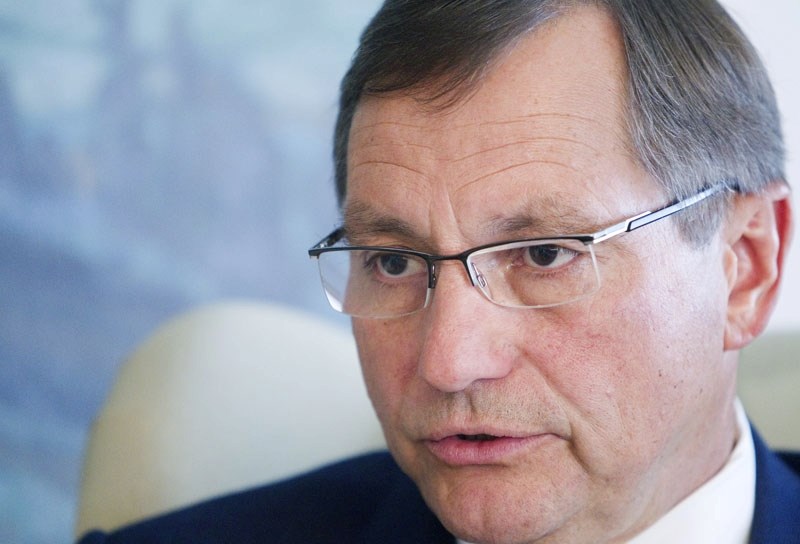With weeks or possibly even days left in his career in politics, Premier Ed Stelmach has trouble remembering what first brought him to public life.
"If I recall, 25 years ago, I must have been complaining about something in a coffee shop and my neighbour said, 'Well, do something about it, and run for office,' " he said. "Quite frankly, I can't even remember what it was."
A quarter-century has passed since Stelmach won his first elected seat on the Lamont County council, starting on a path that would lead him to the premier's office.
In a sit-down interview with the Gazette this week, Stelmach said the time on the local council prepared him for provincial politics, because at the time, it also placed him as a school trustee and a representative on two hospital boards.
"It really prepared me for the future as an MLA, though I had no idea I would be seeking the nomination in 1993."
Stelmach is stepping down just shy of the 25-year mark and before his fifth anniversary as premier. He said, when he looks back, he believes he accomplished everything he set out to when he ran for the leadership and has fulfilled the commitments he made in the 2008 election. He said sticking around beyond that would be more about his ego.
"We all need a certain amount of ego to be in politics, and it is, how do you control your ego? I am comfortable that we brought the province to this point."
Right track
Stelmach said the future is bright for Alberta, with a wealth of natural resources, healthy government finances and great people.
"When you look at Alberta today within the context of North America — not just Canada but North America — we are leading in job growth, highest investment growth."
He said that, with debt trouble in both Europe and the United States, Alberta can't sit back. The province has to look to new markets, like China and India, and create the infrastructure to trade with those countries.
"My concern is that our railway system is already taxed. We do need another pipeline to the West Coast and, when all that falls into place, the economy will continue to grow," he said. "It is one thing to sell something to a customer, but you have to get it to them to complete the sale."
In reflecting on his biggest accomplishment, Stelmach highlights the North West Partnership, a trade and labour mobility deal between Alberta, British Columbia and Saskatchewan.
"As an accomplishment — not a legacy; I want to make that clear, because Albertans will figure that one out; some historian will write a book, I am sure, about the era — to me personally, the most sentimental was the signing of the North West Partnership," he said. "We finally started talking to our neighbouring provinces after 105 years."
Stelmach said that accomplishment sticks out because his Ukrainian grandparents almost settled his family in Saskatchewan instead of Alberta.
He said the work on internal trade barriers has to continue.
"We have to remove as much as we can. We have come a long way, but we have to do it across Canada, because those internal trade barriers are costlier today than some of the issues we have in trade with the United States."
Stelmach said the pressure the province is seeing on the environmental image of the oilsands comes from those who don't know enough about what the province is doing.
"We continue to be the only jurisdiction in North America that has a levy in place to reduce carbon by $15 a tonne," he said. "Anybody who may point fingers at the province, my immediate question is, 'What are you doing? What is your plan?'"
Few surprises
Stelmach said there was little about his time in office that surprised him. He said he knew he would be under tight public scrutiny and expected the long hours the job requires.
The recession, Stelmach candidly admits, and its scale was not something he saw coming, but he said, by storing money in the sustainability fund, the province was able to weather that storm.
"Did I anticipate such a huge global recession? I can tell you now I didn't. But I am happy at the fact that we were prepared for the recession."
He said the stimulus money the province spent on infrastructure put construction workers back on the job and helped to shelter Alberta from the worst of the recession.
He said critics of that spending miss the point, that Alberta was able to build much-needed infrastructure at reduced prices.
"Why would we want to delay it and hit inflation of 10 or 15 per cent again? And in the meantime, where are we going to educate our students? [What about] the sidewalk?"
Replacements
Stelmach said he hasn't kept a close eye on the race to replace him.
"I am not paying attention to the forums. The odd time I pick up the paper and read what is happening, but I am not following it closely."
He said his replacement has to present a positive vision for Alberta and then go the step further of articulating how it will be accomplished.
He said the long race is a real challenge, one he is happy the candidates are taking. He said people who called for a quicker race weren't thinking about the need to engage the public.
"What were they going to do, sell 5,000 memberships?" he asked. "Obviously somebody didn't have the best interests of the Progressive Conservative Party of Alberta at heart."
Stelmach said he will miss public life, but he will also enjoy getting back to his family and being free of some of the obligation of politics.
"Twenty-five years in public life certainly takes its toll. Somebody else sets your schedule and there are those events that you miss," he said. "I am not complaining, but sooner or later, you say, 'When is it time?'"



